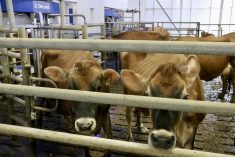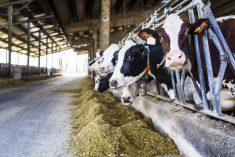Pizza Pizza is the latest brand to sport Dairy Farmers of Canada’s “Blue Cow” certification-of-origin mark in its marketing, putting an old fight over the pizza chain’s cheese provenance to rest.
DFC and Toronto-based, TSX-traded Pizza Pizza — which as of March 31 included 622 Pizza Pizza and 103 Pizza 73 outlets across eight provinces — announced Thursday the company will showcase DFC’s Blue Cow in select Pizza Pizza marketing campaigns nationwide.
The Blue Cow logo rollout began in Ontario this spring and will spread across all Pizza Pizza and Pizza 73 locations throughout Canada later this year, DFC said.
Read Also

U.S. livestock: Cattle fall sharply as Trump says he’s working to lower beef costs
Chicago cattle futures fell sharply on Friday after U.S. President Donald Trump said his administration was working to lower the…
Upgraded to its current form in 2016, the Blue Cow is DFC’s symbol certifying products as made with 100 per cent Canadian milk and milk ingredients.
In this case, DFC said Thursday, the Blue Cow “assures Pizza Pizza’s customers that the mozzarella cheese topping they know and love is made with 100 per cent Canadian milk.”
The logo has been displayed on product labels and in campaigns by processors such as Agropur, Lactalis, Gay Lea, Organic Meadow, Fairlife and Bothwell Cheese, as well as by fast food chains such as McDonald’s Canada in a soft-serve ice cream campaign last summer.
In all, DFC said, the logo has been used by over 500 licensees, including about “three dozen” restaurant chains, on about 8,600 products.
“DFC looks forward to partnering with Pizza Pizza as it expands across the country, further supporting our commitments behind the Blue Cow that have made it one of Canada’s most trusted brands,” DFC president Pierre Lampron said in a release.
The logo, he noted, is recognized by “no fewer than nine out of 10” Canadians.
“Customers know the Blue Cow and now they can support Canadian farmers by grabbing a slice of their favourite pizza,” Adrian Fuoco, vice-president of marketing for Pizza Pizza Ltd., said in the same release.
Pizza Pizza, he said, is “a homegrown success story, enriching the livelihoods of over 700 local franchisees, and the Blue Cow reaffirms our strong ties to hardworking Canadian farmers and small business owners.”
The chain in recent years has built up backstories for several of its products and ingredients, billing its chicken products as coming from birds raised without antibiotics and fed all-vegetable-grain diets, and pizza dough made with 100 per cent Canadian wheat. It also committed itself to source egg ingredients from “100 per cent cage-free sources” by 2025.
The chain has also launched new products such as plant-based protein toppings and crust options such as a cauliflower-based crust and an “Uncrust” for keto dieters.
‘Food preparation’
The Canadian chain’s cheese sourcing hasn’t always been Blue Cow-grade, however.
Eight years ago, it was a sore spot with DFC and Canada’s provincial milk marketing boards, when the chain was found to be importing pre-packaged pizza topping kits combining shredded mozzarella and sliced pepperoni from the U.S.
The pizza kits at that time were classified for tariff purposes as a “food preparation” and thus weren’t subject to the tariff rate quotas (TRQs) imposed on dairy imports under Canada’s supply-managed dairy marketing system.
The dairy organizations at the time criticized the chain’s actions as “a blatant example of circumvention of the government’s tariff system” on cheese imports.
DFC and the provincial boards in 2013 tried to challenge the Canada Border Services Agency’s (CBSA) classification of the pizza kits at the Canadian International Trade Tribunal (CITT), but were rejected for lack of standing.
Later that year, the federal government plugged that loophole by requiring that the cheaper U.S. mozzarella in such kits be classified under the tariff lines for fresh cheese, regardless of their packaging.
The Canadian Restaurant and Foodservices Association, a longtime critic of Canada’s dairy pricing framework, criticized the federal government at that time for having “suddenly shut down a pizza cheese import process that the courts have twice upheld.”
Deliveries up
In its year-end financials in early March, Pizza Pizza reported overall system sales of about $488.3 million for the year ending Dec. 31, down from $553.5 million in 2019.
Same-store sales growth was down 12.5 per cent in 2020 from 2019 on the pandemic-related loss of walk-in sales and “non-traditional” sales such as those from its kiosks at sports and entertainment venues.
However, the company noted an increase in delivery sales at its Pizza Pizza and Pizza 73 stores alike, which “partially offset this reduction.” — Glacier FarmMedia Network


















